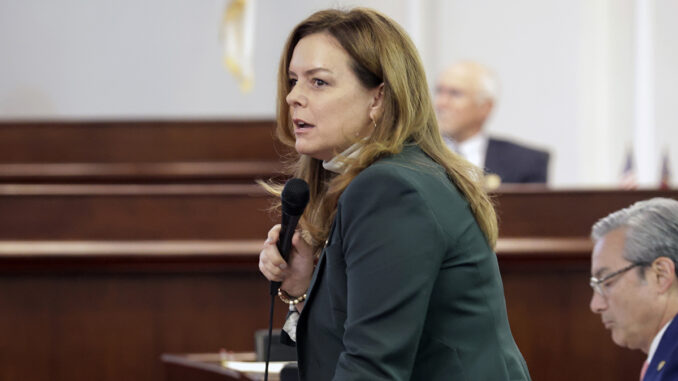
RALEIGH — All three of Gov. Roy Cooper’s vetoes issued during the legislative short session have been successfully overridden by the legislature.
The vetoes overridden include House Bill 198, DOT Legislative Changes; House Bill 237, Various Criminal and Election Law Changes; and House Bill 834, Juvenile Justice Modifications.
House Bill 198 is an agency bill submitted by the N.C. Department of Transportation (NCDOT) that includes changes to various contracts, turnpike fees, extension of the Build NC Bond Act and the Outdoor Advertising Control Act, which is the section the governor carved out in his veto.
The changes to the act expand the areas and authority for outdoor advertising owners to remove vegetation around their signs, both with and without permits, while making some procedural changes to the permitting process. The act expands the area around existing sign locations where owners can cut vegetation up to 300 feet on either side without a permit, increased from 200 feet previously.
“Ever since taking office, the governor has put political posturing over sound public policy,” Senate Transportation Committee Chairwoman Vickie Sawyer (R-Iredell) said in a statement on the override of House Bill 198. “That was on full display with his veto of House Bill 198, which kowtows to the Green New Deal liberals in Washington. This bill, which implements recommendations from his own agency, will help the long list of stakeholders that are impacted by our transportation infrastructure.”
House Bill 834 modifies the Raise the Age law by altering the definition of juvenile delinquent and requiring 16- and 17-year-olds who commit certain serious felonies to be sent automatically to Superior Court instead of juvenile court.
Between Jan. 1 and June 26 of this year, there have been at least 19 juveniles being charged or sought for murder or attempted murder in North Carolina.
“There are thugs on the streets who wear masks so they can get away with harassing, and sometimes attacking the public and police,” Sen. Danny Earl Britt Jr. (R-Robeson) said of the override of Juvenile Justice Modifications. “The governor sought to continue encouraging this behavior with his veto of House Bill 237, but the legislature was never going to let that happen.”
House Bill 237 contains changes to pandemic exemptions to laws prohibiting the wearing of masks by requiring those wearing a surgical mask for health reasons to temporarily remove it upon request by police or by a property owner for identification purposes. The bill, now law, also enhances penalties for wearing masks to conceal one’s identity and prohibits certain governmental entities from imposing additional restrictions on religious institutions during emergencies.
The new legislation introduces harsher penalties for certain individuals wearing masks during the commission of crimes. If an individual is convicted of a misdemeanor or felony while using a mask to hide their identity, their offense would be elevated by one class compared to the original crime.
It also imposes stricter penalties for blocking streets, escalating from a Class A1 misdemeanor to a Class H felony for repeat offenses.
Additionally, the willful obstruction of emergency vehicles constitutes a Class A1 misdemeanor. Protest organizers can face both civil and criminal liability if such obstruction results in injury or death.
The provisions on elections law changes seem targeted at allowing the Republican Governors Association’s Super PAC to contribute directly to the state GOP, matching what the Democratic Governors Association has been doing through its non-Super PAC arm.
During floor debates, Democrats staged a walkout opposing the changes, alleging they unfairly benefit Republicans for the 2024 elections.
While allowing more money from federal groups, the bill maintains existing donor disclosure requirements and bans on earmarking funds.
The changes allow federal Super PACs and 527 committees to contribute to state political parties as long as corporate/union funds are kept separate. Federal committees only need to submit their existing FEC/IRS reports to the North Carolina State Board of Elections, not new reports, and federal PACs can now donate to candidates during legislative sessions, subject to limits.



